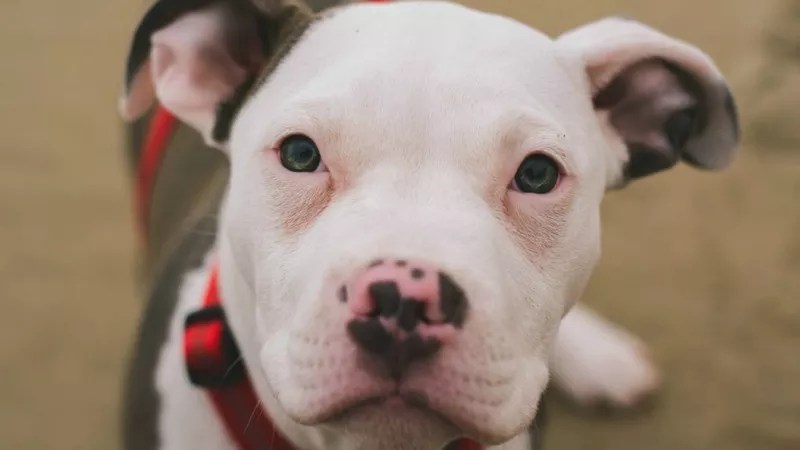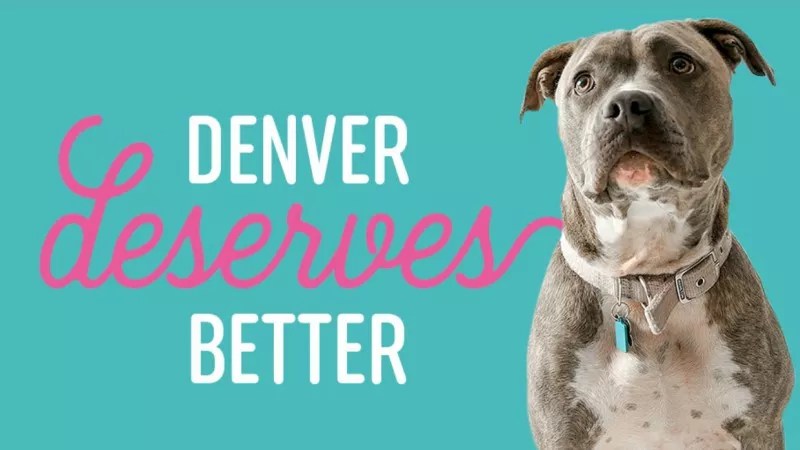
Photo by Lucas Ludwig on Unsplash

Audio By Carbonatix
Editor’s note: The Denver City Council passed member Chris Herndon’s proposal about a restricted breed license on first reading at the panel’s February 3 meeting. Its expected to move to a second reading at the February 10 session. Continue for our previous coverage.
At tonight’s Denver City Council meeting, much of the attention will be on the first reading of a bill sponsored by District 8’s Chris Herndon, who has proposed creating a provisional license for three pit bull-related breeds that have been banned in the Mile High City since 1989.
Expected to be in attendance are many members of Replace Denver BSL; the letters stand for “Breed-Specific Legislation.” Organization co-founder Shira Hereld, who moved out of Denver because of the current rules but will eagerly return if they’re changed, is trying not to let her hopes get too high even though she’s thrilled by recent developments.
“I won’t feel confident until a week after the vote happens,” Hereld concedes. “But I feel extremely optimistic. This certainly feels like the first time in thirty years where there’s actually a chance for this ban to be rescinded.”
This last phrase is not one likely to slip from Herndon’s mouth. During a recent conversation with Westword, mindful of the topic’s controversial nature, he shied away from acknowledging that the measure would essentially repeal the prohibition of ownership by Denver residents of American Pit Bull Terriers, American Staffordshire Terriers or Staffordshire Bull Terriers.
Instead, Herndon characterized the effort as a compromise, since any dog considered a pit would be eligible for a “breed-restrictive license. If you have somebody who should have one of these breeds, and if this bill should pass, they would go to Denver Animal Protection [aka the Denver Animal Shelter] and get a license. They’ll just have to give the name of the owner and the address where the dog will reside, two emergency contacts, a description of the pit bull and a recent photograph, proof that the dog is microchipped and current on vaccinations, and pay an annual fee. And if 36 months pass and the dog doesn’t have any violations of Denver animal ordinances, the dog can transition to the regular license that any Goldendoodle can have now.”
“It’s not an immediate, full repeal, and that’s disappointing in some ways,” Hereld acknowledges. “But we recognize this is the best way to have pit bulls be allowed in Denver again and show people they are safe.”
The inspiration that led to the formation of Replace Denver BSL was a similar effort in Castle Rock circa 2018 that an activist saw at the time as a new model for eliminating Denver’s pit bull ban. Castle Rock eventually approved the approach, which focused on dog behavior instead of breeds, and Hereld and Denver group co-founder Quinn Pigott were appropriately inspired.
“We formed just after Castle Rock began discussions to end its pit bull ban,” Hereld recalls. “It made us realize that Denver might consider doing the same thing.”

A screen capture from Replace Denver BSL’s home page.
Hereld’s advocacy is influenced by experience. “I fostered pit bulls previously, before I lived in Denver, and found that they’re sweet, lazy dogs. I have now adopted a dog that likely would fail Denver’s visual test; she is not noted on her paperwork to be a banned breed, but I imagine I would need to get her registered if I took her back to Denver – and I moved outside the city in large part because of the ban and how strongly I feel about pit bulls.”
Still, she stresses, “My co-leaders and I aren’t basing what we’re doing on our personal feelings. I did a deep dive into research to find out if I was having confirmation bias. I’ve now read so many reports that show dog aggression isn’t based on breed.”
The fruit of this labor is “The Case Against Breed-Specific Legislation,” a briefing book assembled for city council members by Replace Denver BSL. The report includes references to a 2019 University of Denver study that found the city’s ordinance “has had no substantial positive impact on public safety” and a list of communities that have had success with breed-neutral ordinances, including Portland, Chicago, Minneapolis and Boulder.
For her part, Pigott spoke at a January 22 committee meeting about Herndon’s proposal, and she came away upbeat.
“The room was packed and they had an overflow room,” Pigott notes via email. “All eleven council members were present at the meeting. The new ordinance was the only thing on the agenda and took up the whole ninety minutes.” She reports that eight members of the public shared their thoughts, with seven of them supporting the idea (six from Denver and one person who’d moved out of the city because of the ban) and one non-Denver resident in opposition. “Council members were very engaged and asked a lot of questions,” she allows. “The majority of them, they verbally stated, could agree that BSL as it stands was not working. They all agreed to pass it from the safety committee to have further discussions.”
She adds: “For me personally, it was a very nerve-racking but exciting day. After thirty years, to finally get to this point was very rewarding and fulfilling for Shira and I to be a part of. We are very happy with how it came together and that we have gathered so much attention and support.”
Not that Hereld sees passage as a sure thing. She’s particularly concerned about media outlets demonizing pit bulls, as TV news stations in particular have done for decades, often during February ratings periods known as “sweeps.” In recent weeks, CBS4 ran a withering piece based on frightening predictions from a breed-ban backer from Seattle, and Fox31 highlighted a grandmother from Centennial whose grandson had been killed in a pit bull attack – and Hereld wouldn’t be surprised if more offerings like this are unleashed in the days leading up to a final vote.
“It’s extremely frustrating that there’s so much misinformation out there about BSL and pit bulls,” she allows. “But I believe all of us who are talking about this have the same goal, which is to make Denver a safer place. And I believe this bill will do that.”
The next meeting of Denver City Council is scheduled to begin at 5:30 p.m. today, February 3, in room 450 of the City & County Building, 1437 Bannock Street. However, the sit-down will be preceded by a half-hour general public comment session beginning at 5 p.m. at which pit bulls are likely to be a topic.